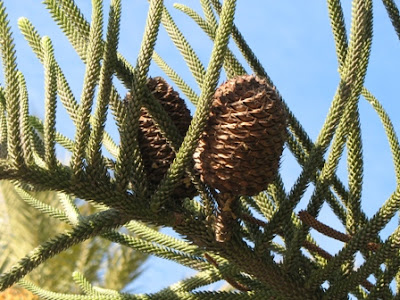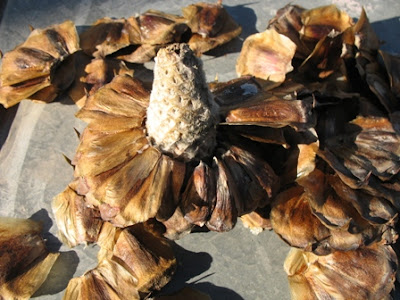 Yesterday I found a Norfolk Pine tree (Araucaria heterophylla) with some mature cones (above) about seven feet off the ground (it was a fairly young tree, about 18 feet tall). With a help of a short stick I pulled the branch down and removed one of the mature cones. As I grabed the cone it practically fell apart in my hands (below).
Yesterday I found a Norfolk Pine tree (Araucaria heterophylla) with some mature cones (above) about seven feet off the ground (it was a fairly young tree, about 18 feet tall). With a help of a short stick I pulled the branch down and removed one of the mature cones. As I grabed the cone it practically fell apart in my hands (below). Using both hands I layed it down and began looking for the seeds. All of the scales fell very easily off of the stem but there were no seeds between them like you would expect from a normal pine cone. (the stem normally stays on the tree long after the scales of the cone have falled off - see bottom picture).
Using both hands I layed it down and began looking for the seeds. All of the scales fell very easily off of the stem but there were no seeds between them like you would expect from a normal pine cone. (the stem normally stays on the tree long after the scales of the cone have falled off - see bottom picture).  Afterwards I went home and looked up the Norfolk Pine in one of the reference books that I have and found out that each of the scales containes a seed (or is in fact a winged seed).
Afterwards I went home and looked up the Norfolk Pine in one of the reference books that I have and found out that each of the scales containes a seed (or is in fact a winged seed).The image below is of the cones when they are still imature and green. When they reach their full size the cones are about 3-4 inches (10-12 cm) tall and about 2.5 inches wide.



The seeds are quite large on a mature tree. I have just harvested about 70 walnut sized nuts from a single cone. The neighbor has his cones removed by a tree service every couple of years because the larger ones are very heavy and could seriously injure someone if they fell.
ReplyDeleteStu,
ReplyDeleteYou might be confusing the Norfolk Island Pine with the Bunya Bunya which has large cones like you mention. Check this link for a good comparison.
http://waynesword.palomar.edu/arbimg4.htm
So wait, I'm confused on where the seeds are.
ReplyDeleteOn a 'normal' pine, say a Jeffrey Pine in North America, the seeds are attached to thin 'wings' and are nestled between the scales of the pine cone. Are you saying that for a N. Island Pine, the scales contain the seeds?
Greg - Yes you understood right. The scales themselves are in fact winged seeds. Each "scale" attaches to the core of the cone on one end, has a pointy protrusion on the other end, has a sort of wing on each side and if you break it open it has an almond shaped seed. In the pictures above all of the "scales" contain one seed.
ReplyDeleteMy neighbor has this tree and the winged seeds blow into my yard everyday. The seeds have a very sharp and pointy needle at the end. In the summer we can't even go outside barefoot on our lawn because they are everywhere and they hurt.
ReplyDeleteWe just bought our home in June and I'm wondering if these seeds drop all year round?
It's so frustrating!
I have 2 Norfolk pines in my front yard. They are about 70 years old and about 100 feet tall. The pine cones on these trees are huge, and roughly the size of a basketball. They only grow near the very top of the tree.
ReplyDeleteAnonymous, are you sure that your trees are Norfolk Pines?? There is another tree in the same family (Aracuacia bidwillii - Bunya Bunya tree) that has cones the size of basketballs. I´ve never heard of any Norfolk Pine with cones as large as baskeballs!
ReplyDeleteDoes anyone know how often they grow cones? Our tree hasn't had them in five years or so and now it has.
ReplyDeleteThe Araucaria cone approx. every 4 years. We have grown them in our C onifer nursery for many years and I have studied the cones and seed of alot of the species.
Deletehas anybody tried eating the seeds? i heard they taste like pine nuts.
ReplyDeleteas for the one who as a conifer nursery, how old does the norfolk pine tree have to be to produce cones?
thanks
Apparently they start producing cones at 10 to 15 years of age.
DeleteI have some Norfolk Pine seeds. Do I have to break them out of the 'scale' to seed them or will they break out naturally?
ReplyDeleteI have five green cones from a Norfolk Pine. Each weigh about 10 lbs. Can I plant them and expect to grow a tree?
ReplyDeleteMy Norfolk pine is 11yrs old 80` high in the Philippines and NO cones. Why ? Anyone help with this question
ReplyDeletei might be late . but i live in florida and have a norfolk fine about 80 feet tall and this GIANT spiked thing fell out of it ... its about 4 inches long and three inches wide.. not ripe and its covered in spikes
ReplyDeleteI too have a norfolk and it does indeed bear cones about the size of a basketball, on the upper branches, often in clumps of two or three. I am told only the females bear fruit and require a male nearby to pollinate. This, combined with the 10-15 year maturity and the 4 year fruiting cycle, as well as the fruit taking about 18 months to ripen (exposing them to risk) probably accounts for why so many norfolks seem barren.
ReplyDelete